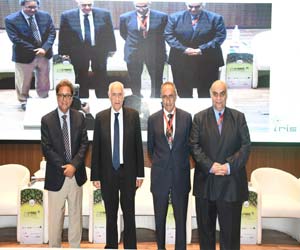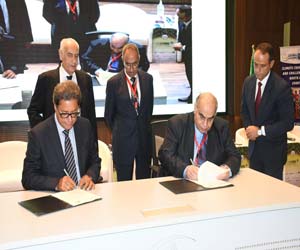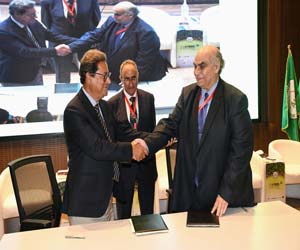Signing a memorandum of understanding between the Institute of Graduate Studies and Agricultural Research in Arid Zones at Ain Shams University and the International Center for Agricultural Research in Dry Areas
A memorandum of understanding was signed between the Institute of Graduate Studies and Agricultural Research in Arid Regions at Ain Shams University "ALARI" and the International Center for Agricultural Research in the Dry Areas ("ICARDA"), regarding joint cooperation between them, this came on the sidelines of the activities of the Regional Action Initiative on Climate Change "RACC" which is hosted by Ain Shams University headed by Prof. Dr. Mahmoud Al-Metini, President of the University and the supervision of Prof. Dr. Mohamed Ayman Saleh, Vice President of Postgraduate Studies and Research, in cooperation with the International Committee for the Development of Drylands (IDDC), the International Center for Agricultural Research in Dry Areas (ICARDA), and the Institute of Graduate Studies for Arid Zones at Ain Shams University during the period from 3-5 September 2022 at El Mahalawy Stadium Faculty of Medicine.
The memorandum of understanding was signed by Prof. Dr. Osama El-Behairy, Dean of the Graduate Studies and Agricultural Research Institute in Arid Regions (ALARI) and Mr. Ali Abu Sabaa, Director-General of the International Center for Agricultural Research, in the presence of Prof. Dr. Ayman Farid Abu Hadid, Emeritus Professor at the Agricultural Studies and Research Institute for Dry Lands, Ain Shams University, and the Minister of Agriculture and Reclamation former lands.
 |
 |
 |
||
The two parties agreed to achieve their common goals, expressing their mutual desire to cooperate in the field of agricultural research, building human capacity and formalizing their relationship according to the following items:
First: The two parties exchange information about the extent, scope and size of their research and training programs in areas of common interest.
Second: The two parties exchange information and knowledge in areas of common interest in the form of newsletters, publications and other media.
Third: Each party invites the other party to participate in scientific meetings, conferences, workshops and seminars that it holds and related to the joint activities of the two parties.
Fourth: The memorandum aims to enhance cooperation in the field of agricultural research through the exchange of visits, consultations and joint studies in areas of common interest, including but not limited to exploring opportunities for joint cooperation with local, regional and international educational and research institutions to conduct studies and research in the field of agriculture in Dry land areas and organizing study and training programs for researchers and workers in dry land areas, especially those affected by drought and salinity, encouraging visits by scholars, students and post-doctoral studies, exchanging scientific documents and information between the two institutions, and organizing activities of common interest, including conferences and workshops in fulfilling their tasks .
It is worth mentioning that ICARDA, an international treaty-based organization established in 1975, is an independent, non-profit international institute governed by a Board of Trustees, headquartered in Beirut, Lebanon, and a member of the Consultative Group on International Agricultural Research with a mission to contribute to improving the livelihoods of resource-poor people in dry areas. By enhancing food security, nutrition and poverty alleviation through research and partnerships to achieve sustainable increases in productivity and farmers’ incomes, while ensuring that natural resources are used and conserved efficiently and equitably.
ICARDA works through a network of partnerships with national, regional and international institutions, universities, NGOs and ministries and is committed to promoting agricultural research, the free exchange of genetic material and information for research and the protection of intellectual property rights, including farmers' indigenous knowledge; and alleviating poverty, especially among women and children.
.svg)




